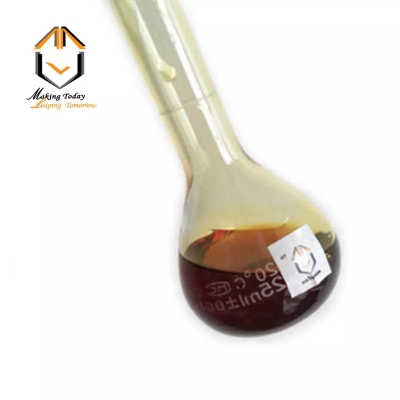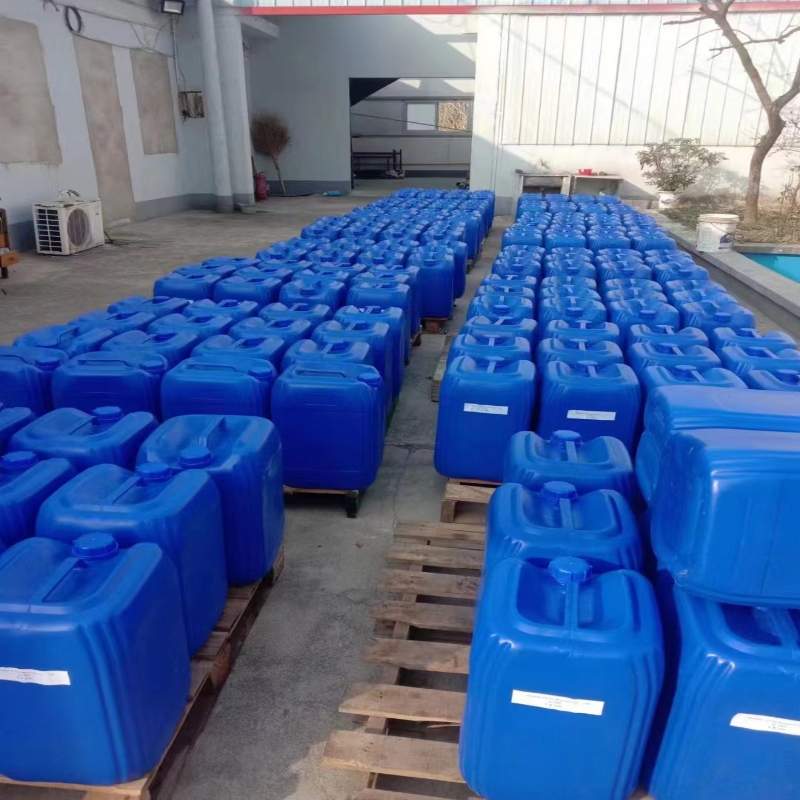-
Categories
-
Pharmaceutical Intermediates
-
Active Pharmaceutical Ingredients
-
Food Additives
- Industrial Coatings
- Agrochemicals
- Dyes and Pigments
- Surfactant
- Flavors and Fragrances
- Chemical Reagents
- Catalyst and Auxiliary
- Natural Products
- Inorganic Chemistry
-
Organic Chemistry
-
Biochemical Engineering
- Analytical Chemistry
-
Cosmetic Ingredient
- Water Treatment Chemical
-
Pharmaceutical Intermediates
Promotion
ECHEMI Mall
Wholesale
Weekly Price
Exhibition
News
-
Trade Service
The concept of intelligent refining is gradually proposed
with the informatization construction of refining and chemical enterprises.
In the 21st century, Aspen Technology Co.
, Ltd.
of the United States first mentioned the concept of intelligent refinery, and quickly popularized the implementation
in large refining and chemical enterprises around the world.
So, how do large domestic and foreign refining and chemical enterprises understand the concept of intelligent refining? Compare the differences between ExxonMobil and SABIC in the United States and the intelligent refining and chemical construction of large domestic refining and chemical integration enterprises, and analyze the gap
.
In the horizontal supply chain, ExxonMobil Company of the United States was the first to start the intelligent construction of
the global oil mobile (GOM) project.
Through the establishment of a professional intelligent optimization team, the system integrates the scheduling platform, realizes the dynamic monitoring and scheduling management of oil products movement in refineries, oil depots and gas stations, provides demand forecast consistency, scheduling timeliness, optimizes product inventory, and improves the ability of integrated business coordination operation in the upstream and downstream of
the supply chain.
Globally, at any given time, ExxonMobil manages approximately 330 million barrels of chemical inventory, enabling inventory visualization and optimization
at a hierarchical and regional level.
In terms of intelligent optimization of the vertical production chain, ExxonMobil first proposed the concept of molecular management and launched the molecular refining project
in 2002.
Through the molecular management technology developed by the professional intelligent optimization team, the reaction kinetics model of many refining units is optimized, and the real-time optimization model is developed, and the real-time optimization of the refining device is realized in combination with the advanced control system, which further improves the refining production efficiency
.
Intelligent device optimization based on molecular management – Real-time optimization online became the most important link
in ExxonMobil's entire refining technology framework.
In energy management, ExxonMobil has established the Global Energy Management System (GEMS), which summarizes more than 200 best practices for energy conservation and 12 types of performance measurement calculation methods
.
SABIC is the largest petrochemical company in the Middle East, specializing in the production and sales of olefins, polyolefins and hydrocarbons, leading
the world in both sales volume and product diversity.
In the horizontal supply chain, SABIC focuses on the integration of various systems such as supply planning, demand planning, production planning, sales and operation, raw material supply, product distribution, and long-term and short-term planning, creating a new supply chain system
.
In the vertical production chain, special emphasis is placed on the design of an integrated manufacturing execution system, which is related to the planning and scheduling system, the resource planning system (ERP), the advanced control system, and the distribution control system, which realizes the real-time optimization of automatic control and improves the sensitivity of market response
.
Finally, the inventory of the forecast material, the composition of crude oil, the use of feed and the production of the product were successfully advanced by 4 weeks
.
The accuracy of material balance is higher, and the production of the device is adjusted and optimized driven by regional demand and supply, which improves the sensitivity of market response and realizes the integration of production, supply, marketing and storage
.
In summary, foreign intelligent refining and chemical enterprises pay attention to the intelligentization of horizontal supply chain and vertical production chain, as well as the construction
of environmental protection, energy saving, safety and comprehensive management of assets.
Due to different processing technologies, the focus of intelligent construction of refineries and chemical plants is different
.
The intelligentization of the horizontal supply chain of the refinery pays attention to the construction of system integration, optimization technology application and logistics coordination, while the vertical production chain pays more attention to the application of molecular refining technology and automation control to achieve online real-time optimization
of the device.
The intelligentization of the horizontal supply chain of chemical plants, focusing on the construction of system integration, logistics collaboration, and market response, and the vertical production chain pays more attention to the application of
advanced control systems.
In terms of operation management, foreign refining and chemical enterprises must first build an intelligent optimization management team and technical team on the enterprise organizational system, followed by the development and application of advanced technology and software to create the most advanced intelligent optimization tool - real-time optimization technology, and finally improve the efficiency of intelligent optimization through effective inter-system integration, and provide the best decision-making solution
for production and operation.
Finally, it reduces the cost of enterprises, improves the yield, production efficiency and market response sensitivity of target products, and greatly improves the economic benefits of
enterprises.
Looking at the domestic large-scale refining and chemical integration representative enterprises, there is still a gap
with foreign companies in the construction and management of optimization teams.
Main performance: In the horizontal supply chain, there is a big gap between the level of intelligent optimization of domestic refining and chemical enterprises, the optimized content, the optimized execution efficiency, the optimized tools and software, and the depth of optimization; In the vertical production chain, the intelligent optimization level of domestic refining and chemical enterprises is still stuck in offline optimization, and some key devices are trying to optimize online in real time, but the online rate is low, the utilization rate of advanced control systems of most devices is also low, and there is a large upward space
in the intelligent optimization of devices.
In terms of energy optimization, only a few domestic refineries have done large-scale system energy optimization work, and the room for improvement is large
.
In summary, the intelligent refining and chemical construction of China's refining and chemical enterprises has a wide range, covers many contents, and the overall level is low, and most refineries have not yet reached the level
of intelligent factory 1.
0.
In view of the gap in the intelligentization of large Chinese and foreign refining and chemical enterprises, it is recommended to strengthen the content construction of the following four aspects to shorten the gap
.
First of all, real-time data is shared and applied in a timely manner
.
Intelligent refining and chemical enterprises have a wide range of data, including crude oil price data, crude oil nature data, crude oil transportation data, crude oil storage data, refining and chemical production data, oil storage data, logistics data and sales data in the horizontal supply chain; The vertical production chain includes crude oil property data, crude oil processing scheme data, intermediate material data, device operation parameters, product quantity and property data, product price data, etc
.
Intelligent refining and chemical enterprises through the establishment of information intelligent management platform to achieve real-time, timely, sharing of data, real-time perception of refinery data and its changes, timely sharing to the relevant important departments, and then through the intelligent optimization model for simulation optimization, in order to put forward the best plan for the adjustment of the refinery processing plan
.
Through the application of online analysis technology and the application of AI big data analysis technology, real-time data sharing and application
of refining and chemical enterprises is truly realized.
Second, improve the ability
of intelligent prediction and early warning.
In the horizontal supply chain, predictive warning can provide enterprises with early warnings such as crude oil procurement risks, crude oil transportation risks, crude oil storage risks, crude oil processing risks, product quality risks, and market demand risks; In the vertical production chain, it can provide potential risk warning for the production process of the enterprise, including the normal operation of small single equipment and the normal operation of large unit equipment
.
Through the most advanced mechanism model technology and AI big data technology, the establishment of accurate prediction model is the key
to realizing the intelligent refining prediction and early warning function.
By capturing effective real-time data and simulating calculations from various prediction models, intelligent refining and chemical companies can predict the production results and economic benefits of the current processing plan of the refinery
.
Once the simulation results are abnormal, the system will automatically warn of possible risks to escort the normal production of the enterprise
.
Third, all links are coordinated and optimized
.
Intelligent refining not only needs to optimize the nature of crude oil procurement, crude oil price, crude oil origin, crude oil transportation, crude oil storage, crude oil processing scheme, production equipment operating parameters and product storage, product nature and price, market changes and other aspects of the horizontal supply chain, but also to coordinate and optimize all aspects of the medium-term and long-term planning of the enterprise to ensure that the overall benefit of the refining and chemical enterprise is maximized
。 In the vertical production chain, due to the large number of processing units of refining and chemical integration enterprises, the complex operation of the device, and the close connection between the devices, the change of one device will bring about changes in the processing plan of the entire refinery, so intelligent refining needs to coordinate the production of each device to ensure that the production of the refinery reaches the best profitability
.
Especially in the refinery integrated refinery, the collaborative optimization of the refinery unit and the chemical plant is more important
.
The establishment of the global optimization model of refining and chemical integration and the model of each unit is the key
to realizing the collaborative optimization of each link.
Finally, intelligent science unifies decision-making
.
Through the functions of real-time data sharing and application in a timely manner, intelligent prediction and early warning, and collaborative optimization of each link, refining and chemical enterprises can make scientific and unified decisions
for enterprises.
Once this decision is confirmed, the system automatically assigns the decision to all parts of the horizontal supply chain and the vertical production chain, and the operators cooperate to implement
it effectively.
The execution result will be fed back through real-time data in the first time, and the intelligent system will judge again according to the new results to ensure that the refining and chemical enterprise is running in the best state at all times and truly realizing intelligent scientific unified decision-making
.
(The author is Zhejiang Petrochemical Co.
, Ltd.
R&D Center)







